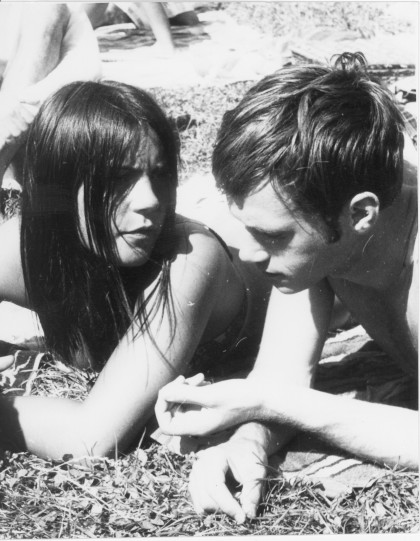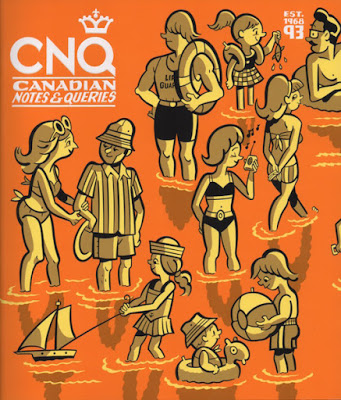Last year, Kim Jernigan, the estimable, indefatigable, generous, and wise former editor of The New Quarterly, emailed me to say she was putting together a special edition of the journal CNQ: Canadian Notes & Queries, and would I write an essay for it. The focus, the demand, was for an essay about rereading: pick a book I had read long ago and recently reread, and write an essay about the difference between the readings (and, perhaps, the difference between me then and me now). I leaped to the task, having just taken another look at Camus’s L’Étranger after years of remembering it a certain way, fixed in my mind since my first reading as a freshman at university. I discovered a new and truly remarkable book. I also discovered that, yes, I am only beginning to learn to read.
CNQ is a print magazine. Issue number 93 is just out, but you’ll have to order a copy to read it. But here are the opening paragraphs.

This photo of DG (as Existential hero) and the mysterious SE at the pool in Freiburg im Breisgau dates from about the time he first read Camus, 1968, and is included with the essay for context.
§
I was eighteen when I read L’Étranger for the first time. I read it in French in a freshman class at York University in Toronto, probably read it in English simultaneously. I think I even wrote an essay about it in French, and that essay might still exist somewhere in a box. Or possibly I dream this, trying to impress myself. I still do remember lines of poems I memorized that year: Mignonne, allons voir si la rose / Qui ce matin avoit desclose / Sa robe de pourpre au Soleil.…
I remember the instructor, a pale, heavy-lidded young man who rarely rose from the chair behind his desk, droning on with his face in a book. He wore a shiny grey suit and a white shirt open at the neck, which I took to be Continental attire. His eyes were invariably puffy and irritated – the word dissipated comes to mind now. I often sat next to a girl named Karen Yolton who was also sleepy, wore black nail polish but nervously tore her cuticles, and whispered scandalous tales of her escapades in a city that was new and alien to me.
I was a little lost and amorphously rebellious and wanted desperately to be an outlaw. I got an F on my first English paper. And perhaps this bled into my reading of Camus, especially Meursault’s carefree sensuality with his lover Marie and his inarticulate defiance of conventional normative language. I remember my teenage outrage at being told to feel what I didn’t feel. That was the thing you noticed in the novel as a young person — the appeal to false authority, the sense of people asking things of you that you didn’t feel and you didn’t feel like giving. Hell, I wanted to sleep with girls and defy authority; Meursault and I were one in my heart, aside from, you know, the small matter of shooting the Arab to death on the beach.
Somehow I always slid over the actual murder any time I summarized the novel to myself, seeing Meursault as a victim of social and linguistic tyranny not a confessed killer. Camus himself famously, and perhaps mischievously, confused his readers by saying, “In our society any man who does not weep at his mother’s funeral runs the risk of being sentenced to death.” This is neither an accurate description of the French criminal justice system nor the novel itself. Meursault shoots the Arab once, then pauses before pumping another four bullets into his body. Meursault’s interrogation before the examining magistrate turns on this fact, for which he has no explanation. But it shreds any chance of his pleading self-defense.
I was eighteen, as I say, and enamoured with the outlaw girl I met in French class, with her ragged cuticles, cigarette rasp, and freckles, and I had no clear idea what Existentialism was except insofar as I had seen a picture of Camus, looking dour and swarthy with a cigarette in his mouth, and somehow had decided this was the very image of the Existentialist hero, a phrase I now realize is an oxymoron, and I would imagine Karen, Camus/Meursault, and myself becoming really good friends, comrades against the (adult) world.
I adopted Existentialism as an attitude rather than an idea. Though deep down I quickly divined the speciousness of its crucial ethical argument, the basic and unworkable paradox of having to create value by making decisions without recourse to values. In time, I came to realize that Existentialism hadn’t amounted to much, had quickly been abandoned even by Sartre who invented it (he became a Communist, then a Maoist). It was only a moment in a long argument in the West between the language of the gods and the language of a world without a supernatural life support apparatus, a world without gods, a world of mere existence. This argument culminated first with Descartes’ Radical Doubt and later, in the early 20th century, in Edmund Husserl’s Cartesian Meditations, after which philosophy veered sharply away from metaphysics into various branch lines: phenomenology, language philosophy, critical theory, structuralism, etc. Existentialism, an extreme 20th century application of systematic doubt, is a version of positivism with a concomitant impoverishment in the ethical and emotional sphere; the human aspect of language wilts.
But at first reading, the critical attitude, the defiant rejection of traditional values, melded seamlessly with my hormones and the biases of the hour: late 1960s counter-culture, Vietnam war protests, the Free Speech Movement, and nationalist revivals in both English Canada and in Quebec. Like many people, I read L’Étranger through the zeitgeist. I had lost my sense of humour, and in my yearning for simple positions, it never occurred to me that a novel might be beautiful, funny, tragic, and mysterious all at once.
.
Read the entire essay at CNQ 93, which has just been published but not yet linked at the web site.
The issue also includes work from Numéro Cinq contributors Caroline Adderson, Susan Olding, and Jeff Bursey, as well as Chris Arthur, Marc Bell, Kathy Friedman, Jason Guriel, the legendary bookseller David Mason, Peter Sanger, Robin Sarah (who just won a Governor-General’s Award), Carrie Snyder, JC Sutcliffe, Jess Taylor, and Anne Marie Todkill.
